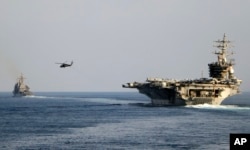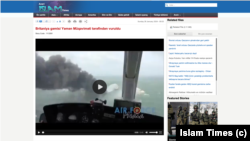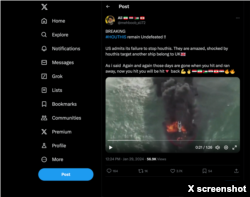Media linked to the Lebanon-based Shiite Islamist party and militant group Hezbollah appear to be behind a social media drive to hype the threat of Yemen’s Iran-backed Houthi rebels attacks in the Red Sea.
The campaign is designed to undermine the United States and its allies’ efforts to secure this vital maritime commercial route.
Polygraph.info reporting exposed one of the key tactics of this campaign as based on recycling old unrelated footage to back the Houthi’s false claims of successful attacks.
Since last November, Houthi rebels have been terrorizing commercial vessels transiting the Red Sea and neighboring waters with missile strikes and hijacking to support the Palestinian group Hamas in its war against Israel.
On January 17, the United States redesignated the Houthis as a major terrorist group on account of those attacks.
On January 31, the Houthis released a statement saying they had targeted the USS Gravely, a guided missile destroyer that has participated in retaliatory strikes against Houthi military infrastructure.
Hezbollah-aligned news media backed the Houthis’ claim, reporting — without evidence — that the group had “directly and accurately” hit the destroyer.
But U.S. officials told CNN the U.S. Navy shot down the Houthis' cruise missile that came within one mile of the USS Gravely on January 30. That was the Houthis’ closest near hit to date.
On January 28, the U.K. also reported it had “successfully repelled” a Houthi drone attack on one of its ships — the HMS Diamond.
The same day, Islam Times, a multilanguage news site run by the Lebanon-based Shiite Islamist party and militant group Hezbollah, published footage showing firefighting efforts around a ship engulfed in flames.
The headline reads:
“British ship [hit] by Yemeni Opposition.”
On January 29, that same footage started circulating on social media, with users repeating the Islam Times headline.
X user mehboob_ali72 with more than 20,000 followers posted the video, writing:
“BREAKING #HOUTHIS remain Undefeated !! US admits its failure to stop houthis. They are amazed, shocked by houthis target another ship belong to UK.”
That post has received nearly 57,000 views, 3,700 likes and over 1,000 reposts at the time of writing.
Over on TikTok, user tadek2023 posted a picture of a burning vessel – a screenshot from the same video published by Islam Times.
The caption reads:
“Breaking news from a Houthi source: 31/1/2024
“Yemini naval forces have launched appropriate naval missiles at the U.S. destroyer ‘USS Gravely’ in the Red Sea.”
These claims are false.
The video does not show successful Houthi attacks on U.K. or U.S. vessels in the Red Sea. It shows footage from the 2021 X-Press Pearl container ship disaster.
On May 21, 2021, X-Press Pearl a Singapore-registered container ship, caught fire off the coast of Colombo, Sri Lanka.
The ship was loaded with plastic pellets and hazardous chemicals, including 25 tons of nitric acid. Despite efforts to put out the blaze, the vessel burned for 12 days before sinking on June 2, 2021.
News media described those events as the worst environmental disaster in Sri Lankan history.
Islam Times consistently repeats pro-Iranian, anti-U.S. talking points, and spreads narratives intended to bolster unsubstantiated claims about Houthi attacks in the Red Sea. That includes repeating the false claim that Houthi strikes in the region have not endangered the right to innocent passage in the region.
The footage of the X-Press Pearl disaster has been used as proof of a Houthi attack on a U.S. cargo ship earlier in January.
That fake was spread across platforms, including YouTube, Twitter, TikTok and Rumble.
Polygraph.info has documented cases of X and TikTok users repurposing old images to make fake claims regarding Houthi attacks in the Red Sea and the surrounding region.
The Israel-Hamas war has likewise seen a deluge of disinformation, as social media networks have been flooded with recycled footage to support false, misleading or unsubstantiated narratives about the conflict.
Many of the false claims documented by Polygraph.info since the Israel-Hamas war began on October 7, 2023, originated on X.
In a January report, the European Fact-Checking Standards Network Project, a consortium of fact-checking and open-source intelligence (OSINT) organizations across Europe, said that X, formally known as Twitter, ranked “worst” in its efforts to fight disinformation.
That report said not a single fact-checking organization surveyed considers X “to take disinformation seriously.”
“The only initiative in place to address disinformation seems to be Community Notes,” the report said.
“This community-driven model does not include any professional or methodological review and, by assigning more weight to users who are more ‘diligent about vetting details of notes,' is open to manipulation and has been exploited to even display debunked disinformation in the notes themselves.”
An investigation by ProPublica and Columbia University’s Tow Center for Digital Journalism released in December 2023 also found that false claims based on out-of-context, outdated or manipulated media had “proliferated on X during the first month of the Israel-Hamas conflict.”
"False claims that go viral are frequently repeated by multiple accounts and often take the form of decontextualized old footage,” the report stated.
Dozens of prominent X subscribers who regularly spread disinformation about the Israel-Hamas war have seen their user bases grow exponentially. Apparently, few of them face consequences for “broadcasting misleading media to their large follower networks,” the report said.
On December 18, the European Commission announced it was opening formal infringement proceedings against X under the Digital Services Act, or DSA, citing its concerns over “the dissemination of illegal content in the context of Hamas' terrorist attacks against Israel,” among others.









